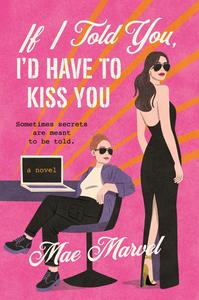
|
|
| Mae Marvel (photo: Alyssa Lentz-Underwood) |
|
Mae Marvel is a pen name for Ruthie Knox and Annie Mare, who have written more than a dozen novels between them and often finish each other's sentences. Mae lives with two teenagers, two dogs, one cat, four hermit crabs, and a plethora of snails and fish in a witchy century house in Wisconsin whose extravagant perennial garden gives them something to look forward to in the depths of winter.
If I Told You, I'd Have to Kiss You (St. Martin's; reviewed in this issue) is a romance about two women who are on the verge of breaking up. Neither knows the other works for the CIA, and the lies they tell each other are ruining their relationship.
What was the spark for creating this novel? Your author's note mentions that the world is better for all the lesbians in it. Was that a big part of why you wrote the story you did?
Often there can be inhibition when a marginalized author writes about marginalized characters. We were brainstorming, and asked ourselves, what is the biggest, most page-turning story that we can make as queer as possible? The answer was: spies!
We gave a nod to spy stories like Alias, Spy with Melissa McCarthy, Mr. and Mrs. Smith, and all the fun wigs and costume changes. We played with the tropes that delight people about spy stories.
And that opened up more fun for us, too: investigating insider tropes of being a lesbian couple. Since we are one--and Yardley and KC are as well.
 Is it trickier to write stories centering queer characters given the current political climate?
Is it trickier to write stories centering queer characters given the current political climate?
The most important thing to remember for any community--marginalized or otherwise--is that there needs to be room for play. What are the different kinds of escapes? Sometimes it's an escape around the world--like a spy story--sometimes it's cozier. And then we try to think about how to make that world fabulously inclusive, where readers are not taken out of the story into the real world.
It means something to us, to have a nonbinary CIA handler, a lesbian couple. We're not apolitical, the overall position was deliberately progressive and inclusive, but the books are focused on the characters and their values, not the world at large. Intelligence agencies are certainly not known to be particularly ethical or kind, and originally we did kind of confront some of the geopolitics that are hurting people, but our editor wisely advised on making the book experience more progressive and exciting.
How do you two split up the writing process?
We just figured out a new way to answer this question: if you ever played a talking game on the playground, like "Let's pretend we're in the forest, and there's a monster"--we do that. We write in a shared Google Doc, which we both have open at the same time, at the kitchen table. But we don't have just one approach. If one of us gets stuck on an emotion, we'll leave it for the other one to write. Or you could say it's like with musicians who rehearse, play together in practice, but then there is an additional magic that comes with making.
Yardley Whitmer III is quite a character. What made you give a woman the name of her father and grandfather?
Yardley's name had its own kind of power. We heard it somewhere years ago, and said that name has power, we should name a character Yardley someday. We gave her that name because she is powerful. She is the Unicorn. She's an ultimate Southern woman, but also incredibly queer. And very obviously someone with all of those characteristics would be a super spy!
It's sort of a Southern writing trope--Southerners being underestimated due to their Southern-ness. Yardley gave us the opportunity to explore that. She is the James Bond of the American South--our most formidable export.
Although Yardley and KC had had an immediate attraction, as the book begins their relationship is crumbling. Yardley realizes that she had never truly opened up to KC, but had blamed it all on the secrets she had to keep as a spy. So between all the shooting and escapes and disguises, she's trying to finally open up. Was it difficult to write a relationship where characters are being vulnerable, but they also have to be strong?
Especially for couples who start with intense physical connection, it can be hard to know that emotional intimacy makes things easier and stronger--and you have to learn HOW to love someone. Of course the title If I Tell You, I'd Have to Kiss You is a wink at the spy genre, but it also is a nod to the fact that they have to actually start telling each other things. Telling each other things finally makes their relationship open up. It took a lot to write a relationship that emotional, balancing the intensity with the international spy fun.
Are there any questions YOU would like to be asked? What are people not asking you about the writing process or this book?
Our very favorite thing to do as authors is to make sure we have that found family aspect. It's important to us to create community. So we asked ourselves, what would a spy found family look like? Could we make it tender and funny, but also spy-y? Handlers, targets, agents, all coming together with a happily ever after.
What's next for Mae Marvel, or for each of you individually?
Mae Marvel has another book next summer--The Guest Book--a sapphic romance, a treasure hunt. Two Americans who both end up staying at the worst English inn--it's incredibly rural and run down. They find a treasure hunt in a guest book, which ends up taking them all over western Europe. A love story, and also a story about how to make yourself happy again after everything has gone wrong.
We also have a new mystery series written under our own names, Ruthie Knox and Annie Mare. They're the Prairie Nightingale mysteries. The first book, Homemaker, is launching June 1.
And Annie has a book called Cosmic Love at the Multiverse Hair Salon coming out in June as well. It's a sapphic, cozy sci-fi. --Jessica Howard, former bookseller, freelance book reviewer

